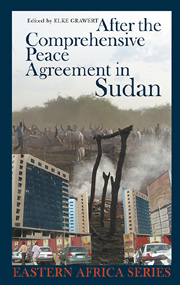Book contents
- Frontmatter
- Contents
- List of Tables & Figures
- Editor's Preface
- Notes on Contributors
- List of Acronyms
- Map of Sudan
- 1 Introduction
- I Implementation & Potential of the CPA
- II Challenges Facing Post-war Societies in Sudan
- 5 The CPA & Beyond
- 6 Ethnic Identity Politics & Boundary Making in Claiming Communal Land
- 7 Return Migration to the Nuba Mountains
- 8 Challenges of Basic Education in Southern Sudan
- 9 Abduction, Confinement & Sexual Violence against South Sudanese Women & Girls in Kakuma Refugee Camp, Kenya
- 10 Identity, Citizenship & Reintegration
- III The CPA in its Sub-regional Context
- IV Beyond the CPA
- Index
- EASTERN AFRICAN STUDIES
6 - Ethnic Identity Politics & Boundary Making in Claiming Communal Land
The Nuba Mountains after the CPA
from II - Challenges Facing Post-war Societies in Sudan
Published online by Cambridge University Press: 05 April 2013
- Frontmatter
- Contents
- List of Tables & Figures
- Editor's Preface
- Notes on Contributors
- List of Acronyms
- Map of Sudan
- 1 Introduction
- I Implementation & Potential of the CPA
- II Challenges Facing Post-war Societies in Sudan
- 5 The CPA & Beyond
- 6 Ethnic Identity Politics & Boundary Making in Claiming Communal Land
- 7 Return Migration to the Nuba Mountains
- 8 Challenges of Basic Education in Southern Sudan
- 9 Abduction, Confinement & Sexual Violence against South Sudanese Women & Girls in Kakuma Refugee Camp, Kenya
- 10 Identity, Citizenship & Reintegration
- III The CPA in its Sub-regional Context
- IV Beyond the CPA
- Index
- EASTERN AFRICAN STUDIES
Summary
Introduction
The underlying root causes of Sudan's civil war, which extended into Southern Kordofan/Nuba Mountains region in 1985, are claimed to have been diagnosed, negotiated and finally transformed into the CPA. Acknowledging the fact that many interwoven causes were behind the eruption of the war, the question of communal customary land rights is postulated here as one of the main root causes of the civil war in Sudan in general and in the Nuba Mountains in particular. After the formal end of the war, the question arises of how, on the one hand, the conflict between the various ethnic groups in Southern Kordofan and, on the other hand, the contradictions between traditional land rights and modern state policy on land rights will be resolved? The issue involves aspects of territoriality, identity, land rights and ethnicity, with their political, economic, cultural, and religious dimensions (see also Komey 2008a: 101–2).
In view of this central question, the objective of this chapter is to highlight ethnographically the emerging claims on customary land rights by the Nuba groups and their persistent contention by the other ethnic groups in the region after the signing of the CPA (see also Komey 2008a, 2008b, 2009a, 2009b). The bone of contention is that most of these claims are articulated in terms of autochthonous rights. Autochthony is the claim to collective rights on the basis of belonging to an indigenous group with strong ties to an ancestral homeland, associated with an articulation of collective rights.
- Type
- Chapter
- Information
- After the Comprehensive Peace Agreement in Sudan , pp. 110 - 129Publisher: Boydell & BrewerPrint publication year: 2010



